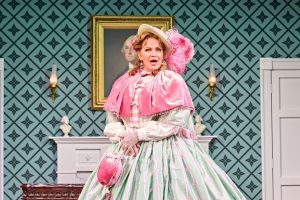Brief Encounter With … Lisa Dillon, the RSC’s new Shrew
Lisa Dillon plays Katharina in the Royal Shakespeare Company’s new production of The Taming of the Shrew, which begins previews in the new-look RST tonight (19 January 2012, opens 25 January).
The Taming of the Shrew is directed by Lucy Bailey and runs in Stratford-upon-Avon until 25 February before touring to Newcastle-upon-Tyne, Milton Keynes, Nottingham, Richmond and Bath.
We last interviewed you about Othello in 2004
Funnily enough I was just thinking this morning about Othello because my Emilia was Amanda Harris, who went on to play Kate in the Shrew, and I imagined an actress playing Emilia might very well go on to play Kate. Then I wondered ‘how many Desdemonas move on to play Kate?’, because in my mind it’s not the natural progression. I’m quite proud that I’ve turned my casting around.
Would you say that Petruchio wants Kate to more be like Desdemona?
But does he? That’s a big question because the kind of Petruchio that David Caves is creating would never settle for a Desdemona, like he wouldn’t settle for the nightmare that Kate is. He doesn’t actually want her to become a conformed, conventional, rigid, moral wet nelly. There’s something beyond being the outcast that Katherine is and actually what he’s encouraging her to be is free. Because I think he sees that her behaviour as Kate is a symptom of the society she lives in and to become one of them is not right either.
He recognises the rebel in her
Yes, because he’s anarchic too. He’s just more in control of his behaviour to a point. In a way they become outsiders together, but they’re very much a unit, which I think is really exciting.
Taming of the Shrew is often labelled misogynistic; it has even been called a ‘celebration of domestic violence’
I don’t think it’s either of those things, and I hope our production will show that. It’s about going beyond what society expects from you and that means neither being a conformist or a rebel that has to rebel because that’s what society expects; both kinds of behaviour are prescribed by the people around you. Because of the extraordinary connection Petruchio and Katherine have, they have the potential to become something bigger and better and bolder and braver than anybody in that world could ever imagine. I think that’s a really great way of looking at it and therefore it’s not misogynistic. There is a lot of violence in the play, it’s written in, but the minute it appears that Kate becomes the victim of Petruchio, we’ve done something wrong.
Are you retaining the ‘play-within-a-play’ element?
Some people cut it because I think they find that it’s got nothing to do with taming the shrew. But it’s actually got a hell of a lot to do with it because Christopher Sly, who is your main man in the play, has something being actively done to him in the same way that something is actively being done to Kate. There are parallels there and he is also anarchic; he’s an outsider, he’s a drunk. It is not coincidental that he’s shown in a play about a woman who has lost control because it’s what’s happening to him.
I think it’s a rather brilliant premise and I never will understand why someone would cut it. It’s a wonderful character and there’s fun to be had with the real audience and the character as an audience member of the play. There are quite a few moments when he’s on stage that the characters in the Kate story cross over and find themselves with Christopher Sly. It’s a lot of fun.
Do you know why the RSC wanted to tackle the play again so soon after the last production (in 2008)?
I don’t know other than I assume it’s been driven by Lucy Bailey wanting to direct it. Also, the tour we’re doing hasn’t been done for a little while and I think it’s exciting for them as a company.
How do you find the new-look Royal Shakespeare Theatre?
We’re still in rehearsal so we haven’t arrived there yet but we’re already very conscious of the space and its challenges and its amazingness. It’s almost like playing in the round to a degree and we have to be aware of that along with its size and scale. We’ll know much more when we get in. Things will have to be adapted and tailored to the space. Of course going on the road means all kinds of venues, so the production will have to adapt as we travel.
The company is entering a period of transition. Are you picking up on any of that as actors?
Not really. Michael (Boyd) has been really excited about the production and amazingly supportive. Even with what’s going on with the infrastructure, it still feels like a very stable and confident place to work at the moment, which is great.
What do you identify as the major roles, collaborations or general directions you’d like to go in next?
One of the highlights of my work so far was the play I did last year at the Almeida, The Knot of the Heart. David Eldridge wrote that role for me after I was in Under the Blue Sky in the West End and the success of the piece was amazing – so something I would definitely like to continue is that creative relationship with David. Maybe that would mean we could extend that story to television, we’ll see; it would be an exquisite ambition to have fulfilled.
Role-wise it’s hard to say. It’s an amazing thing to do Shakespeare. If you love acting you get a kind of withdrawal symptom between doing Shakespeares and it feels like perfect timing to be back at the RSC and to be playing Kate, so that’s a big tick.
I’d love to do some more comedy and I’d love to some American plays. I did a Tennessee Williams a few years ago, and I’d love to do an Arthur Miller. It’s also a lifelong dream to be in a Sondheim musical. I’ve actually co-written a new musical with an amazing composer (Dillon’s partner Tim Arnold) – it’s a project outside of my acting work that I’m very passionate about.
Can you tell us more about your musical?
It’s called Secrets of Soho and it’s a beautiful story that charts four decades of Soho and the West End. It explores the alternative culture of 1960s Soho and takes us into present day with a young girl coming to Soho for the first time looking for her father. I’m so excited about it, the music is divine and really unusual. The show that we hope to achieve is a challenging re-imagining of the musical genre; it doesn’t conform to the usual musical format. We also don’t have a London musical at the moment. Broadway is so self-celebrating, yet the West End doesn’t have this. I won’t be so pompous to say, ‘this is it,’ but it certainly could be. I can’t wait for next spring to pick it up again and really focus on that.
– Lisa Dillon was speaking to Theo Bosanquet












